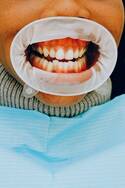
12 May Gum health is a key factor for general health throughout life
Brussels, 10 May 2024. Gum health may play a pivotal role in overall health and quality of being, and deserves to be better acknowledged and explored by the research community. That is why the EFP promotes Gum Health Day 2024 on 12 May, an outreach initiative celebrated in more than 30 countries around the world to raise awareness among the medical profession and the general public of the importance of periodontal health. Dr Mia Rakic, Gum Health Day 2024 co-ordinator and member of the executive committee of the EFP (European Federation of Periodontology, efp.org), explains why Gum Health Day 2024 focuses on Generation Z and why gum health is so relevant:
MedicalResearch.com Interview with:

Prof. Mia Rakic
Dr. Mia Rakic PhD
Specialist in Periodontology and Oral Medicine
Senior Research Associate at Univeristy Complutense of Madrid
MedicalResearch: What is Gum Health Day 2024?
Mia Rakic: Gum Health Day 2024 is the international celebration of gum health. Celebrated on 12 May, Gum Health Day is devoted to raise awareness about the vital importance of oral hygiene for healthy gums, as well as the crucial link between gum health and systemic conditions. It is addressed to the general public, but also to the scientific and medical community. The campaign is promoted by the EFP and implemented by our national member societies of periodontology at their respective countries. Additionally, the EFP promotes Gum Health Day 2024 together with familiar dental and medical organisations for an optimal outreach of common objectives: good health for good life.
Gum disease is recognised as a major public-health concern as it is associated with negative impacts on local oral health, major systemic conditions (diabetes, myocardial infarction, heart failure, stroke, chronic kidney disease, adverse pregnancy outcomes, rheumatoid arthritis, Alzheimer’s disease, and erectile dysfunction and even cancers), overall wellbeing and social interactions and dental health cost-effectiveness.
MedicalResearch: Why has the EFP chosen the slogan “Gums rock”?
Mia Rakic: Every year, the coordinator of Gum Health Day works with the European Federation of Periodontology executive committee to carefully analyse the burning issues in the domain of periodontal health care and designs accordingly the campaign to target its target audience effectively. The slogan was crafted this year to resonate particularly with the younger generation, specifically Gen Z, while using the edutainment approach. The rationale of the campaign is: If you learn about it you can prevent it! The focus remains on universal education about dental hygiene practices, negative impacts of gum disease on orthodontic treatment, dental implants and systemic health, and how respective detrimental consequences can be easily avoided.
We feel that targeting the young generations (expected to be periodontally healthy, or at least in the initial stage of disease) is an optimal way to maintain periodontal health. Additionally, the younger generations can spread good practices to the next generations, directly supporting the Gum Health Day initiative, and this is very important.
MedicalResearch: What causes gum diseases? What causes plaque?
Mia Rakic: Gingivitis and periodontitis are caused by accumulated dental plaque (bacterial deposits) on the tooth and implant surface that causes local inflammation in the surrounding tissues. Briefly: without adequate oral hygiene, dental plaque accumulates at the tooth/implant surface causing gingival inflammation. With uninterrupted accumulation, dental plaque becomes more pathogenic causing more a detrimental inflammation associated with substantial destruction of surrounding periodontal and peri-implant tissues, and respective spread of the disease to the bone. The spread of the inflammatory processes to the bone triggers the onset of the periodontitis and/or peri-implantitis associated with irreversible tissue damage. Bacteria associated with periodontal and peri-implant diseases are able to avoid immunity and to shift from physiological bacteria to bad bacteria, but this requires accumulation of the dental plaque, which is why regular oral hygiene plays a pivotal role in prevention of gum diseases.
MedicalResearch: Is there a difference between ‘periodontal diseases’ and ‘gum diseases’?
Mia Rakic: Both expressions, ‘periodontal disease’ or ‘gum disease’, basically mean the same. Periodontal disease is commonly used in health care community, while the gum disease is readily adopted by general public.
MedicalResearch: What types of gum diseases are there?
Mia Rakic: Gum diseases comprises of disorders affecting supportive tissues of the tooth and today, with the widespread use of dental implants, the supportive tissues surrounding dental implants as well. Simply said, the most common gum diseases include inflammatory diseases induced by infection, mostly affecting the gingiva and connective tissue-soft tissues (such as gingivitis and peri-implant mucositis), and those additionally affecting the supporting bone (such and periodontitis and peri-implantitis), and non-infective induced mucogingival deformities and deficiencies (such as receding gums on teeth and implants). There are other more specific categories of gum disease but those are definitely the most common.
MedicalResearch: Is periodontal disease an infection? Is it contagious from mother to baby?
Mia Rakic: Periodontitis and gingivitis are indeed induced by infection but they belong to the group of non-communicable diseases, which means they are not spread from one individual to the other directly. However, research studies have demonstrated that mother and child share a comparable microflora, which means that the mother’s oral health is of critical importance to decrease the baby’s risk for common oral diseases such as periodontitis and caries.
MedicalResearch:- Are mouthwashes good or bad for oral health?
Mia Rakic: Mouthwashes are a powerful tool for periodontal infection control. However they should be carefully used and in accordance with the recommendations by an oral healthcare professional. This is important not only for achieving more effective outcomes, but also for avoiding antimicrobial resistance and development of opportunistic infections such as oral mycoses. Thus, patients should consult a dentist about the choice and use of mouthwashes.
MedicalResearch: What is the best type of toothpaste and toothbrush to use?
Mia Rakic: The choice of the optimal toothpaste and toothbrush will depend on specific conditions, habits, and age of each individual patient. For example, a patient susceptible to suffer from receding gums should be advised to use soft brushes. But this is just one example, hence choosing the optimal oral hygiene tools should follow a consultation with the dentist. It should be however stressed that the key factor for periodontal health lays in regular oral hygiene habits using appropriate oral hygiene techniques.
###
About the EFP
The EFP (European Federation of Periodontology, efp.org is a non-profit organisation dedicated to promoting awareness of periodontal science and the importance of gum health for oral-health professionals and the public. Its guiding vision is “Periodontal health for a better life”.
Founded in 1991, the EFP is a federation of 38 national periodontal societies representing more than 16,000 periodontists, dentists, researchers, and oral-health professionals in Europe and around the world. It organises workshops, events, and campaigns grounded in evidence-based science in periodontal and oral health, including EuroPerio (the world’s leading congress in periodontology and implant dentistry), Perio Master Clinic, Gum Health Day, and Perio Workshop.
The EFP’s work in education is also highly significant, notably its 24 accredited university-based programmes for postgraduate education in periodontology and implant dentistry.
The EFP has no professional or commercial agenda.
###
Last Updated on May 12, 2024 by Marie Benz MD FAAD
